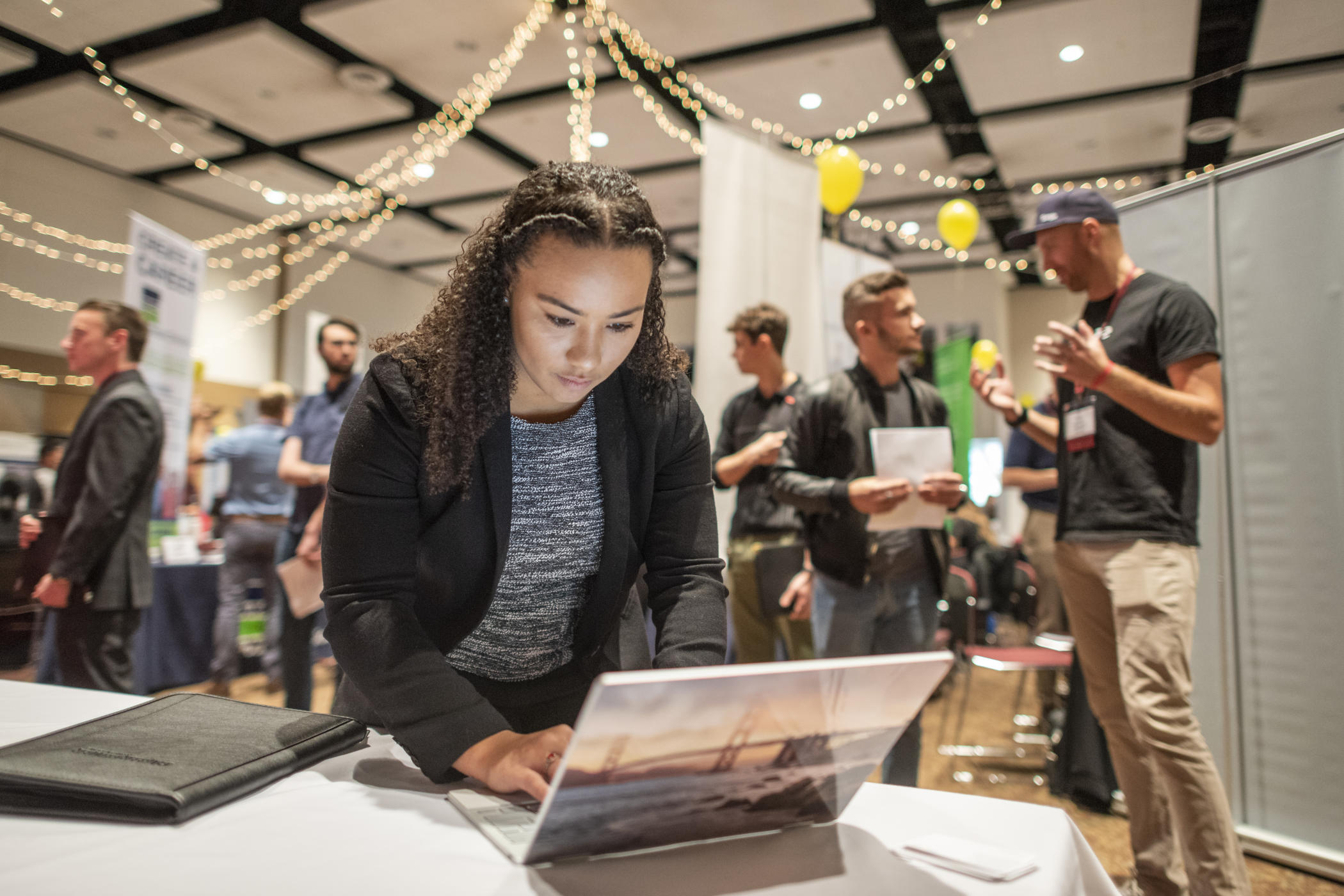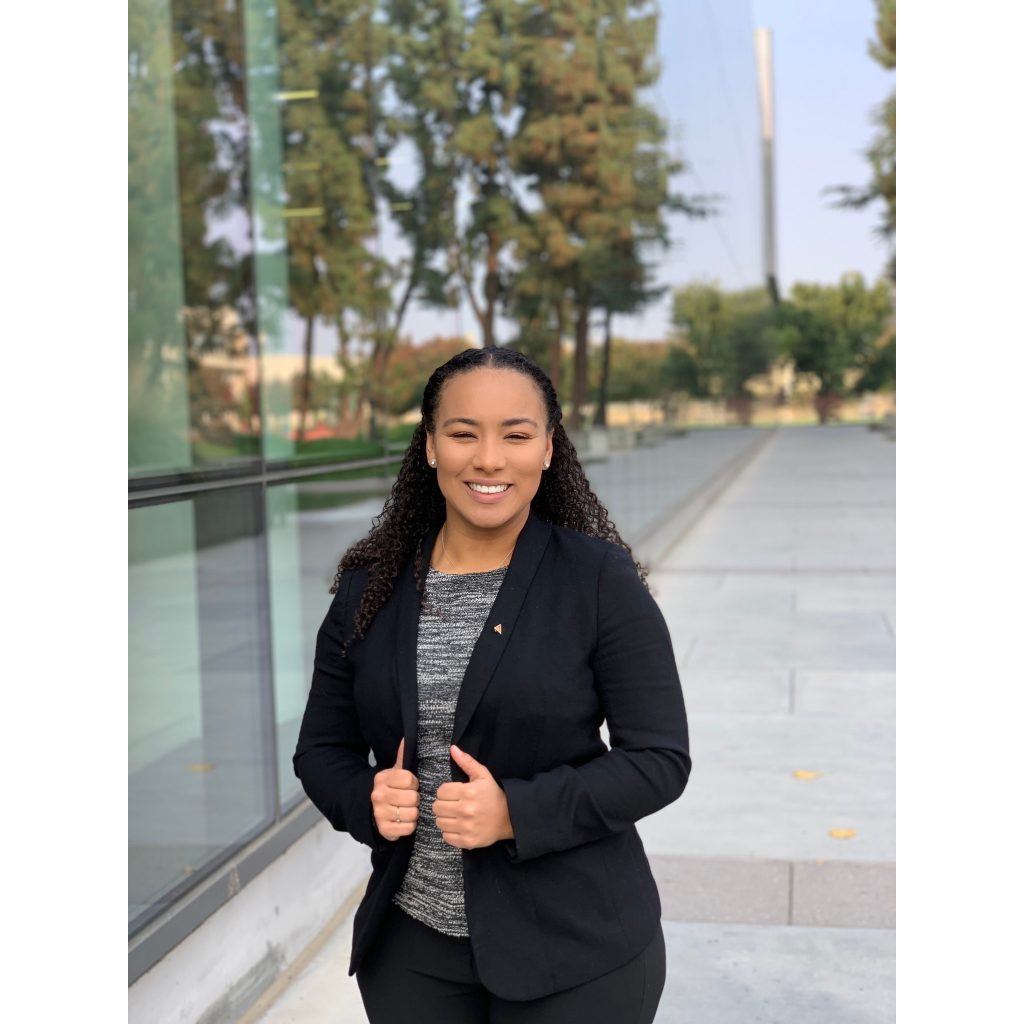With Alumni Donations, Business Students Dress the Part

Miliah Haslerig signs up for contacts after talking with Chico State alumni representing employer Google during the Career & Internship Fair Wednesday, November 7, 2018 in Chico, Calif. (Jason Halley/University Photographer/CSU Chico)
The saying tells us we shouldn’t judge a book by its cover.
In reality, though, first impressions are crucial—especially in the business world.
With the onus on students to dress to impress for career fairs, job interviews, and other professional networking opportunities, many can struggle to put together a presentable ensemble. Sharp-looking clothing isn’t cheap, and it can be tough to pay for it before actually landing the job. That is where the Professional Attire Fund comes in.
The program is part of the College of Business’ Business Student Success Center, and formed thanks to alumni donations, most notably an initial $15,000 commitment from Marti Easton Sutton (Business, ’92). For the last two years, she and her husband, John, have been the fund’s largest supporters.
As a woman in the field of business in the early ’90s, Sutton was an anomaly, she recalls. Chico State gave her the skills she needed to be confident before she even set foot in an interview, and today she wants to ensure that financial challenges are no barrier to students following their dreams.
“We must help our students do better, regardless of what obstacles they face. By investing in our students at Chico State, we invest in our future,” she said. “These students are our future executives, HR managers, farmers, salespeople, artists, writers, social workers, scientists, and so much more. When our students succeed, we as a society benefit greatly.”
The Suttons recently renewed their commitment to the college with an additional $100,000 for its initiatives, including the Professional Attire Fund. February’s Chico State Giving Day push raised an additional $3,150 for the fund, plus an anonymous donor match to boot.
“It’s a way to help jump-start a career for students who really have a significant need,” said Billy Harkness, program coordinator of the Business Student Success Center. “We have quite a few students who are really ambitious and driven, but a lot of them are financially impacted and not in the position to afford appropriate business attire. They shouldn’t have to miss out on opportunities because of that.”
Instead of receiving cash, students select clothing items in-store to put on layaway within their award budget; the University then approves and completes the purchases.
The program has parameters in place as to what prize money can fund, with students in need eligible for up to $500. Typical business wear purchases are allowed—suits, button-down shirts, blazers, cardigans, dress pants, blouses, ties, dress shirts, socks, and shoes—and there is no price limit for any single item. In fact, Harkness said, students are encouraged to purchase fewer items of high quality, rather than trying to build a wardrobe of mediocre clothing.
“The idea is really to get something for yourself that you wouldn’t normally get because of how much it costs,” he said. “A really sharp black, navy, or gray suit is something you can use for a long time, and it’s better to have just one or two great suits, where the quality really stands out. This lets students be Nordstrom or Men’s Wearhouse shoppers, to go to places they normally wouldn’t shop.”

“When I know I look presentable, I feel good about myself. Instead of worrying about how I look, I can focus on my interview questions and preparing myself to be a good candidate,” said junior Miliah Haslerig, who received a Professional Attire Fund award last year.
Junior Miliah Haslerig, a fall 2018 award recipient, took that concept to heart, equipping herself with J.Crew pants and a matching blazer. With the right clothing, the business administration major said, she was able to present herself more confidently at interviews and job fairs. That wasn’t always the case. She recalled working at American Assets Trust in San Diego, the youngest person in a real estate investment office, and feeling conspicuously underdressed—as a student, her money went to school and housing, with little left over for professional attire.
“Winning this award was such a big help, just to get clothes that I know will make me feel confident. … When I know I look presentable, I feel good about myself,” Haslerig said. “Instead of worrying about how I look, I can focus on my interview questions and preparing myself to be a good candidate.”
Haslerig especially valued that her award funds came from within the Chico State community, and said she won’t soon forget the impact such donations made. In the future, she plans to pay it forward.
“Having alumni involved makes it much more special,” she said. “The support of future graduates is something I hope to equally give back, some day.”
Whether students are gaining interview experience or have been in the workforce for years, the challenge in dressing appropriately can be as much about experience as affording attire. Business administration major Steven Maciel, who, at age 40, has held “just about every job under the sun in Chico,”—construction worker, warehouseman, taxi driver, and retail worker—said he has often experienced unfamiliarity with what businesspeople might consider “professional” dress.
His first experience in such a setting was as a purchasing assistant at Fifth Sun. Finally invited to attend meetings, but wearing warehouse garb that was often sleeveless shirts, shorts, and a ball cap, he was acutely aware of a perception that he didn’t belong.
“I stuck out like a sore thumb,” Maciel said. “Even though I’m good at meeting people, I was missing how to interact with other professionals and how to dress.”
Now, with a two-child family to support and an education to pay for, Maciel felt similar stresses when it came to affording presentable business attire. He applied for and was awarded clothing funds, a major boon toward his feeling of belonging to the business world.
He especially liked the feeling he got when trying on and purchasing a vest—an item he’d never considered splurging on, considering he hadn’t even owned a suit before.
“I still feel like I stick out, but in a very different way now,” Maciel said with a laugh. “It just comes down to confidence. Just the feeling of putting on a suit, preparing yourself, and walking out the door—I felt like people were taking me more seriously. I felt like the business world opened up to me a little bit wider.”
Find out more about the program and how to apply by visiting the Business Student Success Center online.


